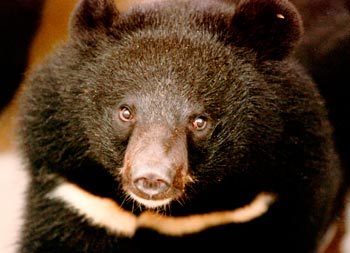Grace Ge Gabriel
To ensure the survival of both animals and people on this earth, we have to change our own behavior.
thousands cry out online against bear farming in China
In December 1996, I witnessed eight Asiatic black bears walk to freedom at the first bear sanctuary China had ever seen, set up by the International Fund for Animal Welfare. Fifteen years later, a Chinese bear farm associated company is trying to expand the cruelty-plagued industry by applying for an initial public offering (IPO).
Have animal welfare campaigns achieved nothing in the past decade and half? Some might wonder. Isn’t there any progress in ending animal cruelty in China?

I am angry of course about the audacity that a company based on animal cruelty dares to go public. However, I am also pleased to see that the IPO application has generated a new wave of public condemnation against the practice that inflict pain and suffering to animals represented by the bear farming industry. This time, the outcry came almost entirely from Chinese citizens.
In the past three weeks, the fierce debate online has attracted millions of people who expressed overwhelming opposition to the IPO.
A well-known TV celebrity Zhang Quanling wrote on her Sina microblog: “If Guizhentang, which extracts bile from live bears, is listed publicly, the number of tortured bears will increase from 400 to 1,200. Guizhentang says that its tubeless bile-extraction methods don’t cause the bears pain. But, heavens, can it really be painless to be confined in such a narrow space every day? Is it really painless having an open wound that never heals? We have long been able to artificially make the active ingredient in bear bile or to replace it with herbal medicines, such as rhubarb. Why do we have to hurt the bears?”
This Weibo post was forwarded 38,089 times and as many as 7,710 people commented on it.
Another microblogger using the name “Southern Barbarian” said: “Businesses should have a conscience. I believe that anyone who has witnessed the drawing of bile from live bears will oppose this horrific industry. It is OK to raise animals for slaughter, but it is not OK to maltreat them. By maltreating animals we blur the basic distinction between right and wrong.”
“We can’t expect every company to be imbued with a sense of morality, but we have to take the initiative and uphold a minimum level of ethical standards for the market,” wrote a market analyst. “If these kinds of companies all go public, then that’s encouraging the mistreatment of animals, human greed, and moral depravity.”
The spotlight on bear farming came at a great time as the country’s legislative bodies—the National People’s Congress and the National People Political Consultative Committee--are about to convene their respective annual conferences in March. Last year’s conferences already saw an unprecedented number of proposals on wildlife conservation and animal welfare. I anticipate that there will be more proposals this year calling to end bear farming and promulgate legislation to prevent cruelty to animals.
It may take the international animal welfare campaigners to expose the cruel practice of bear farming. But to end the suffering of animals in China will depend on the citizens of China to speak up against animal cruelty and pass laws that will uphold moral standards and govern human behavior in how animals are treated.
Facts about bear farming:
-- Grace Ge Gabriel
Grace Ge Gabriel
To ensure the survival of both animals and people on this earth, we have to change our own behavior.
Our work can’t get done without you. Please give what you can to help animals thrive.
Unfortunately, the browser you use is outdated and does not allow you to display the site correctly. Please install any of the modern browsers, for example:
Google Chrome Firefox Safari